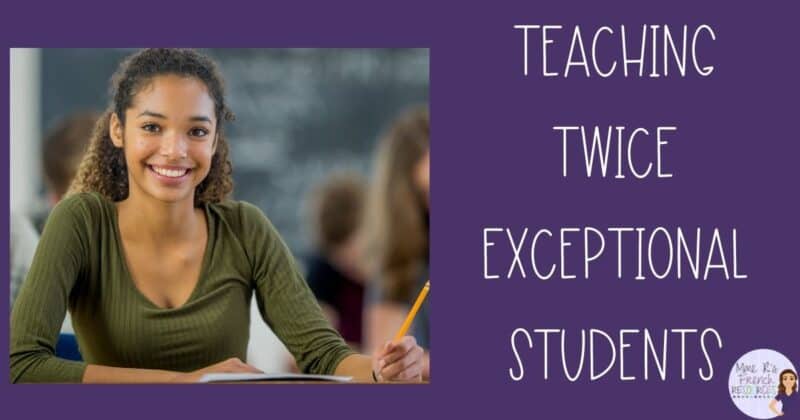
How familiar are you with the term twice exceptional? If you’re like me, maybe you’ve just started hearing about it. For me personally, it only came to my attention when my son was diagnosed as twice exceptional. Before that, I had taught well over 1000 kids, and I definitely had some who would have been considered twice exceptional, but I had no idea that was even a thing!
So, what does twice exceptional mean?
Simply put, twice exceptional (also known as 2e) refers to a student who is intellectually gifted but also has a learning challenge such as ADHD, dyslexia, or dysgraphia. They fall out of the norm in two ways : they are gifted, so they are above average but they have a disability, meaning that learning new material can have different challenges for them.
I really like the Youtube channel How To ADHD, and the creator, Jessica McCabe, made a great video explaining twice exceptionalism.
Challenges for twice exceptional students
- According to the Davidson Institute, twice exceptional students are some of the most under-identified and under-served students in our schools.
- They can be hard to understand. If teachers can see that they are very bright, they don’t understand why they are struggling. If teachers see them struggling, they don’t always notice how bright they are.
- Students with slow processing speed often need more time on an assignment, although the assignment itself is not that challenging for them. For teachers, this can be confusing, because it isn’t obvious why this bright student can’t get work done on time.
- Sometimes students who are twice exceptional can go undiagnosed, because their giftedness masks their disability. They end up looking like an average student. Other times, their disability prevents them from showing their intelligence, so they are, again, right in the middle of the class.
- They often develop asynchronously. This means that the development of skills doesn’t happen at the same time as many other kids. For example, a child may be able to understand math concepts that are several grade levels ahead while he or she also struggles with basic math facts (personal example from my house!)
- They may not be placed in advanced classes because they are not “high-achieving” but the content in the regular classes is too easy.
How can you support twice exceptional students?
- Integrate technology- Students who struggle with visual processing may have above average reading comprehension, but because their eyes struggle with tracking, reading is much harder for them. Allow them to read a larger print text or listen to audio as they read. If they struggle with paper-pencil tasks, allow them to type or use voice to text tools.
- Help them with executive functioning skills – Some gifted students may lack the organization to write down homework assignments, organize a binder, or manage their time well. Take a little time at the beginning of the year to help ALL students by modeling good organization, then check in on your students who struggle to help them stay on track.
- Give them tasks that help them show their strengths rather than making the work easier because of their learning challenges. These are really bright students who don’t need easier work, and they might even get bored or frustrated if it’s too easy for them. Rather than make it easier, you can give them challenging work and modify the length of the assignment or allow them choice in how they will demonstrate understanding.
- Remember that while twice exceptional students are gifted, they do have real learning challenges that make some class activities more challenging. They are not just being lazy if they need more support! If a twice exceptional child is struggling to take notes because of a challenge such as poor motor skills, visual processing issues, or dyslexia, provide him or her with the notes. Remember: just because they are bright doesn’t mean they don’t need support.
- Don’t give assignments that are just busywork. For some 2e kids, paper-pencil tasks can take MUCH longer even though the assignment is below their actual ability level. They are basically taking a long time to do an assignment about something they have already mastered long ago.
- Get help when you need it! Reach out the the special education coordinator, school counselor, or the student’s parent for assistance.
A final note about twice exceptional students:
It’s important to note that many gifted students strive for perfection. This is also true for twice exceptional students. They get really frustrated, because things that should not be hard for them may be challenging. 2e students might get embarrassed if they need help, and they may not ask for their accommodations if they have an educational plan. That doesn’t mean they don’t need them.
Want to learn more about twice exceptional students? I love The Neurodiversity Podcast for all kinds of information to support neurodiverse students. The host, Emily Kirchner-Morris, is a former gifted education teacher who now has a private counseling practice where she offers gifted and family counseling and education testing services. There are many episodes that have helped me gain a better understanding of twice exceptionalism.


Leave a Reply